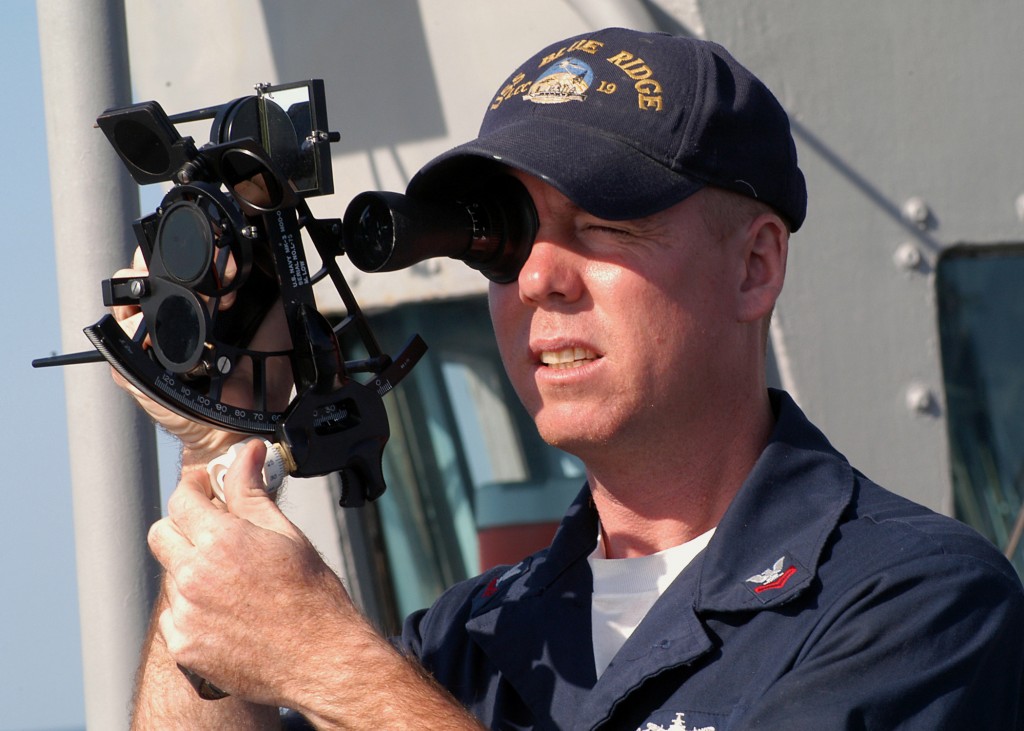
031025-N-8955H-005 Aboard USS Blue Ridge (LCC 19) Oct. 25, 2003 — Quartermaster 2nd Class Martineau, from Ft. Lauderdale, Fla., uses a sextant to shoot the sun line from the port bridge wing of USS Blue Ridge (LCC 19). U.S. Navy photo by PhotographerÕs Mate 1st Class Novia E. Harrington. (RELEASED)
Last week it came out that the US Navy has added celestial navigation to its officer training programme again. The Royal Navy learned this the hard way recently with its newest ships losing all power at random times due to a design fault and being unable to navigate in sometimes awkward situations!
With routine cyber attacks from China adding a new dimension to electronic warfare, the powers that be in the US realised that no matter how good your technology is, your crews still need to navigate – computer or no computer!
The same applies to yachts. What happens if your generator dies and your electrics go? That can happen from the silliest chain of events – I was on a boat a few years ago where the skipper put the fridge on to keep the beer cool and the batteries didn’t have enough juice to start the engine. Without the engine we couldn’t charge the batteries. If we were on a trip longer than a day we would have had to stop using the GPS soon enough and start fixing with our position using a hand compass and chart.
What happens if you get hit by lightning at sea, 100 miles offshore at night? Lightning fries your electrics and most vessels just aren’t built to withstand a million volts passing through their mast!
One of the greatest regular offshore races is the Bermuda Race from Newport RI to the Atlantic island of Bermuda. The 635 mile race is from a massive continent to a tiny island and without pinpoint navigation you may well miss the island altogether! As such there are three prizes for navigators in the race – the George W Mixter Trophy, the Schooner Mistress Trophy and the Navigator’s Prize that recognise the supreme effort and skill of the navigator aboard.
Traditionally this used to be a job of celestial navigation, where the navigator sweated over tables, charts and a sextant to get the vessel to the needle in a haystack that is Bermuda. Even today you wouldn’t really want someone aboard as navigator if they thought that a sextant was a pretty ornament for the fireplace. After missing Bermuda you may reach Africa in a few weeks…
Where it is easy enough to switch on the GPS and follow your route up the coast, one of the most important jobs of the skipper aboard is to ride out problems as they arise.
Engine gone? Short tack into harbour. Rudder linkage broken? Fix it and sail home, or use your sails to steer the boat.
You should have redundancy for almost every eventuality without being so anal you are carrying enough supplies you can sail across the Atlantic when you are in fact just out for a jaunt up Falmouth Harbour!
All good sailing courses will teach you how to fix your position using a chart and landmarks or lights on the coastline. Taking three bearings and remembering them long enough to draw a three point fix on the chart really shouldn’t be a worry for anyone, and even the lowliest of crew should be able to do this while you are up to your ears in the engine trying to get it going again.
If you are planning a passage that involves being out of sight of land for more than 48 hours you really should consider a celestial navigation course. Let’s face it, most sailing doesn’t involve such transits – from the UK you could sail in almost every direction and be in sight of some shoreline or another in that time.
The RYA runs an excellent celestial navigation course through its RYA Yachtmaster Ocean course. This is the apex of sailing qualifications for the leisure sailor and is really only done by the person planning on a round the world trip or crossing the Atlantic.
The ASA runs the ASA 107 Celestial Navigation course, that can be done independently of the rest of their syllabus unlike the RYA. To that extent I’d hazard the ASA scheme is probably better than the RYA scheme on this front as those who like to be prepared can do the course without investing thousands in doing other courses before it.
On every decent length trip at sea something will happen from a crash gybe to a minor engine problem. Sailors love to tell their tales over a pint in the pub but it is also a matter of pride that they don’t get rescued unless it is a dire emergency.
You do have idiots who rely on the rescue authorities to tow them in after making a tit of themselves on a regular basis, but if they are doing that then what happens if there’s a genuine emergency that they can’t reach because of you? All sailing is down to being prepared, and learning the basic skills of manual navigation is part of that!
ABSOLUTELY AGREE!!
We have our Skippers and Crews always checked, that they haven’t only learnt it but Keep practicing during trips.
Our sailtraning and course-branch makes sure, that People learn from the very beginning, that there is more than only GPS, PLotters and the charter damage waiver